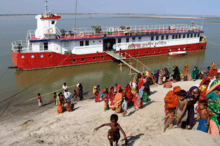Friendship (NGO)
 | |
| Formation | 2002 |
|---|---|
| Founder | Runa Khan |
| Type | Non profit and non government organization |
| Headquarters | Dhaka, Bangladesh |
| Services | Health, Education, Sustainable Economic Development, Disaster Management and Infrastructure Development, Good Governance, Cultural Preservation |
Key people | Runa Khan (Executive Director) |
| Website |
friendship-bd |
Friendship is a needs-based non-governmental organization that works in the most remote and inaccessible islands, riverbanks of northern Bangladesh and the remote coastal belt in the south. Established by Runa Khan in 2002, Friendship works to empower people through a sustainable, integrated development approach.[1]
Friendship employees more than 1,500 employees that includes field staff, regional office staff, staff in the floating hospitals, teachers at Friendship schools, trainers at vocational schools, organizers and supervisors working in the northern and southern parts of the country and head office staff based in Dhaka.
History

Friendship began with the innovative concept of a floating hospital. French sailor and aviator Yves Marre sailed a river barge from France to Bangladesh to donate it for use by the people of Bangladesh. The concept was realised when the river barge was converted to a fully equipped floating hospital, the Lifebuoy Friendship Hospital (LFH).[2][3][4]
Since then, Friendship has progressively developed a healthcare system to provide comprehensive quality health and information to the remote river-based communities of northern and southern Bangladesh. Two more floating hospitals were introduced: the Emirates Friendship Hospital in 2008 with the sponsorship of the Emirates Airline Foundation and the Rongdhonu Friendship Hospital, former Rainbow Warrior II from Greenpeace, in 2012.[5][6]
Starting from 2005, a system of mobile Satellite Clinics was set up, complemented by health workers to serve communities at the grassroots level. Presently, each month, approximately 250,000 persons are treated thanks to Friendship’s health program.[1]
Recognising that the broader goal of enabling these communities to improve their living conditions and gain control over their lives requires more than healthcare support alone, Friendship has progressively built its distinctive integrated community development model, which includes; health, education, disaster management and infrastructure development, good governance, sustainable economic development and cultural preservation. Today Friendship helps about 500,000 people every month.[7]
Friendship’s work areas

Friendship supports communities mainly in the shifting northern river islands, known as “Chars”, of the Brahmaputra and Jamuna rivers and in the coastal areas of the Bay of Bengal. Friendship is active in 22 Upazilas over 12 Districts of Bangladesh. Today, its operations are most intense and multi-Sectoral in the districts of Kurigram and Gaibandha in the North, and Patuakali and Satkhira in the South.
Friendship International
Three years after Friendship went into operation in Bangladesh, Runa Khan took steps to set up a network of supporting organisations in Europe. Today Friendship is present in 5 countries in Europe including Luxembourg, France, Netherlands, UK and Germany.[8]
Awards
Friendship
- World Crafts Council’s Award of Excellence for Handicrafts (2014)[9]
- Best performing NGO in Gaibandha (2011, 2012-2013) and Kurigram (2012-2013, 2013-2014, 2014-2015)
Runa Khan
- Business Excellence Award from Arthokonto and Bangladesh Chamber of Commerce of Singapore (2014)
- Social Innovation Leadership Award by the World CSR Congress (2014)
- Schwab Foundation Social Entrepreneur Award (2012)[10]
- Guest of Honor at the Rolex Awards for Enterprise (2011)
- SCWEC Women Entrepreneur Excellence Award (2010)[11]
- IDB Award for Contribution to Women in Development (2008)[12]
- Rolex Award for Enterprise (2006)[13]
- Women Entrepreneurship Award by Arthokonto (2003)
- Government award for best design for the book “The Flower Maiden and Other Stories” (2001)
- Ashoka Fellowship for innovative teaching methodology (1994)
- Innovative teaching methodology became part of the accepted system of the National Curriculum Educational Board in Bangladesh (1990)
- Runner-up in National Award for books on education “Playschool Activity Book 1 and 2” (1990)
References
- 1 2 "New models of working and partnership in development: the example of Friendship, a Bangladeshi organisation". Alternatives Humanitaires. 16 May 2016.
- ↑ "For the Right to Live with Hope and Dignity". The Daily Star. 15 January 2016.
- ↑ "The One Who Answered the Call". The Daily Star. 20 June 2015.
- ↑ "A floating hospital for the poor". Daily Monitor. 20 June 2015.
- ↑ "Emirates opens floating hospital in Dhaka". Gulf News. 24 November 2008.
- ↑ "Friendship launches another hospital ship". The Daily Star. 15 November 2012.
- ↑ "The friendlier side of Davos". Euronews. 25 January 2016.
- ↑ "Friendship: a network, projects and outlets". Banque de Luxembourg. 25 May 2014.
- ↑ "World Crafts Council's Award of Excellence for Handicrafts 2014".
- ↑ রুনা খান সামাজিক উদ্যোক্তা পুরস্কারে ভূষিত. Amar Desh (in Bangla). 10 September 2012.
- ↑ "Take a byte from these city women entrepreneurs". The New Indian Express. 30 November 2010.
- ↑ "IDB Award for Saideh Ghods, the Mahak chief". Payvand Iran News. 8 July 2008.
- ↑ "2006 Associate Laureate, Cultural Heritage Bangladesh". ROLEX Awards for Enterprise. 22 January 2006.